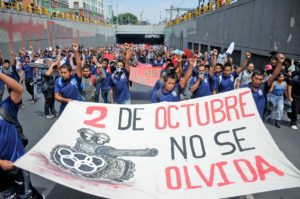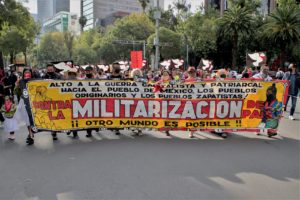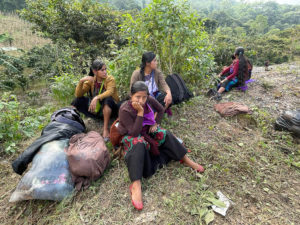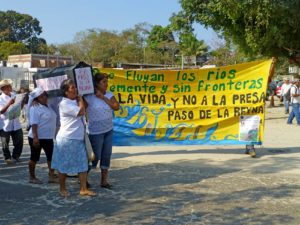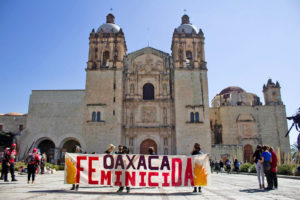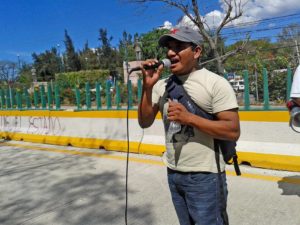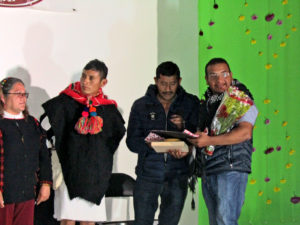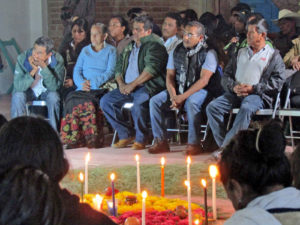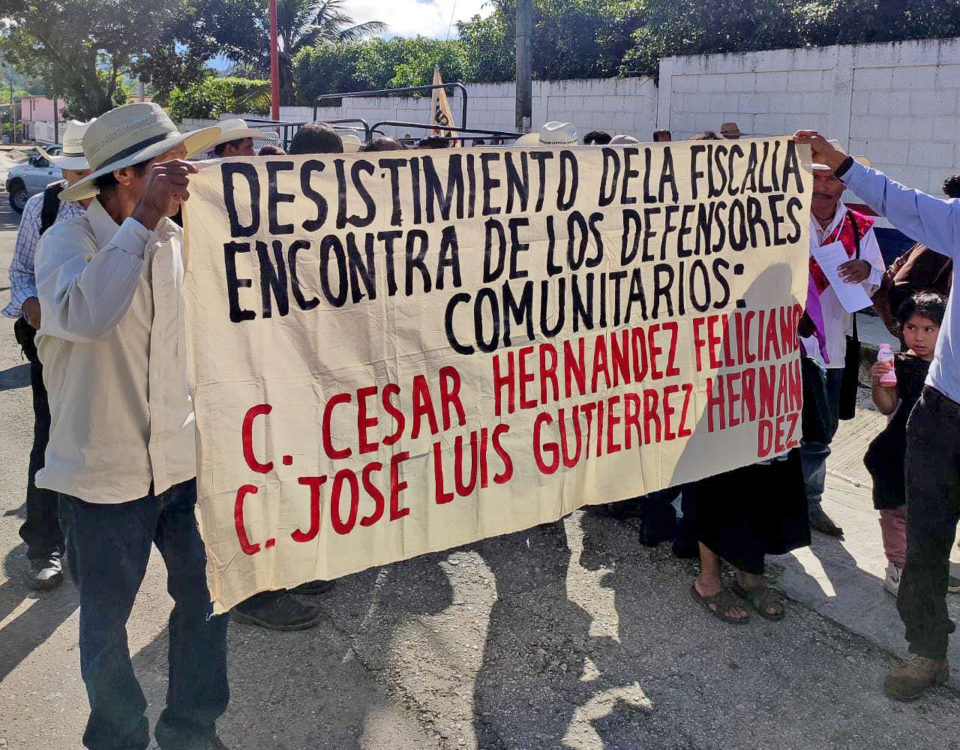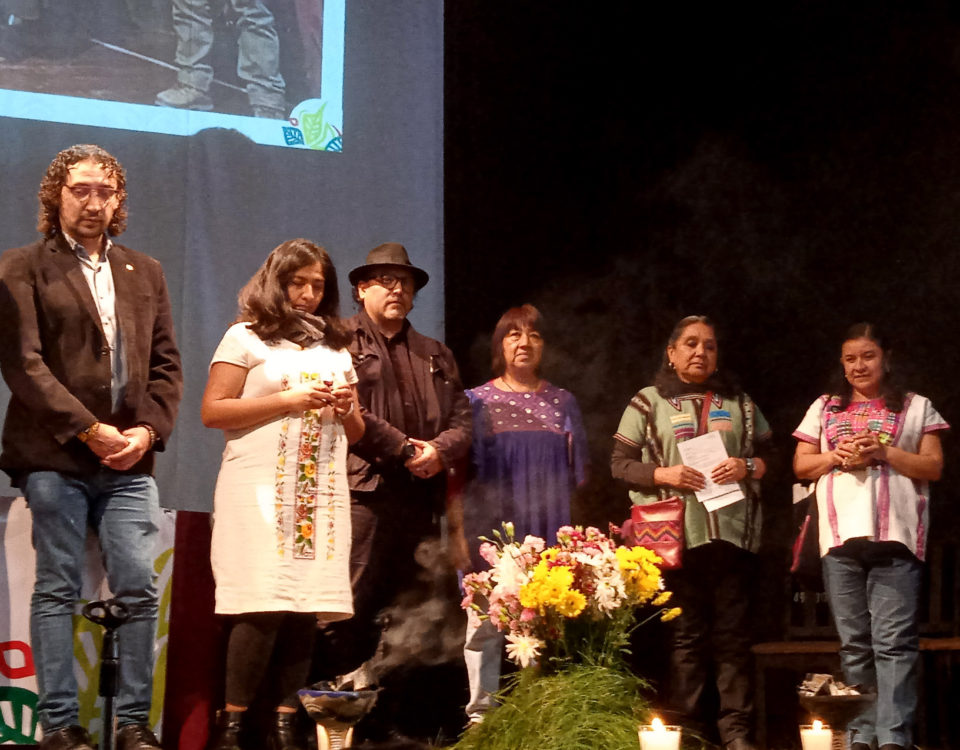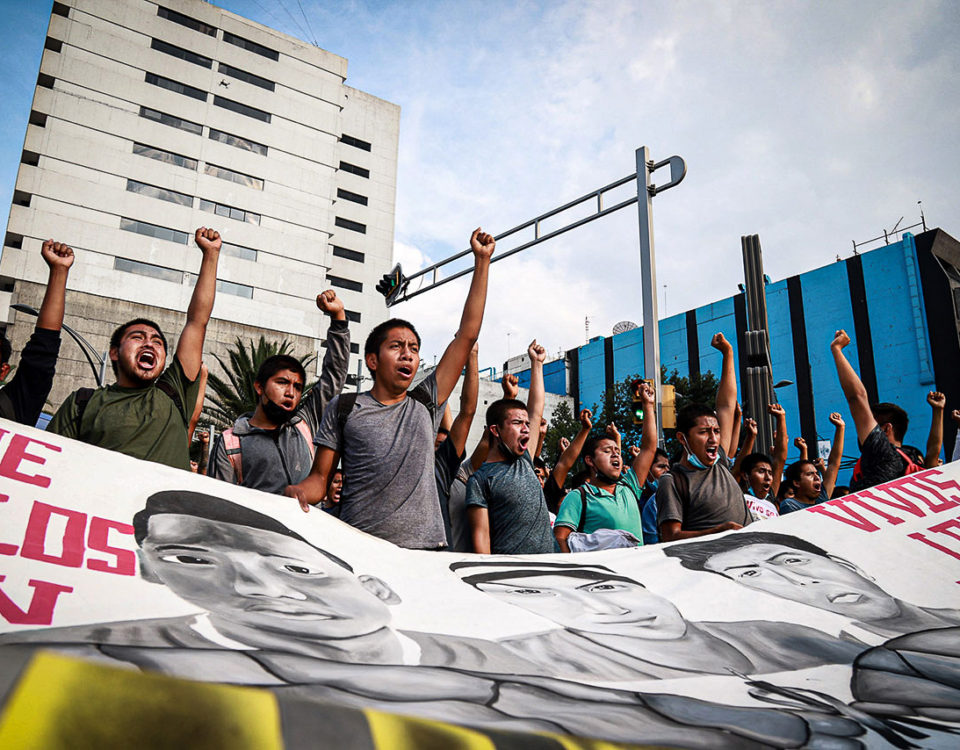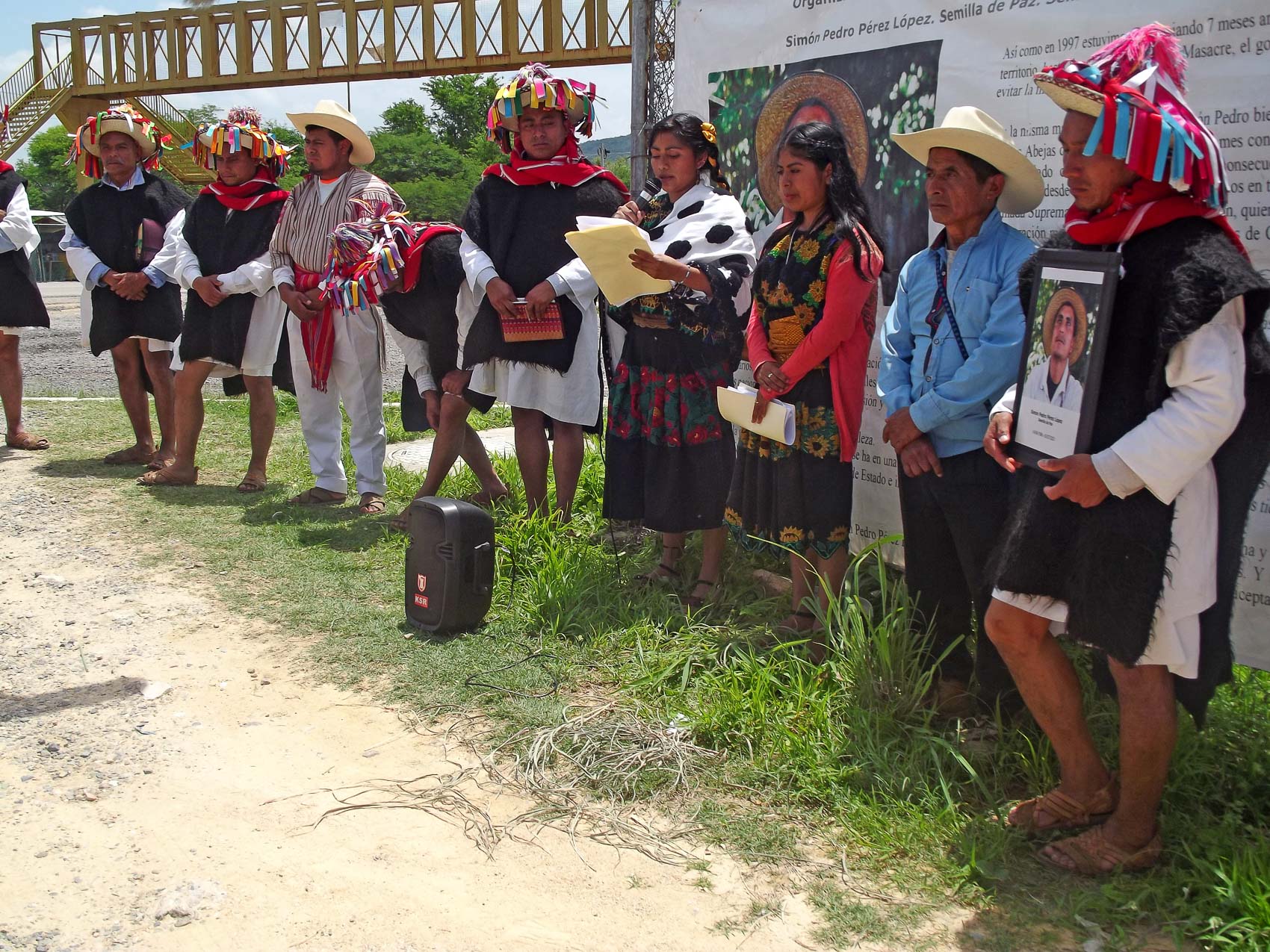
SIPAZ Activities (From mid-May to mid-August 2022)
12/09/2022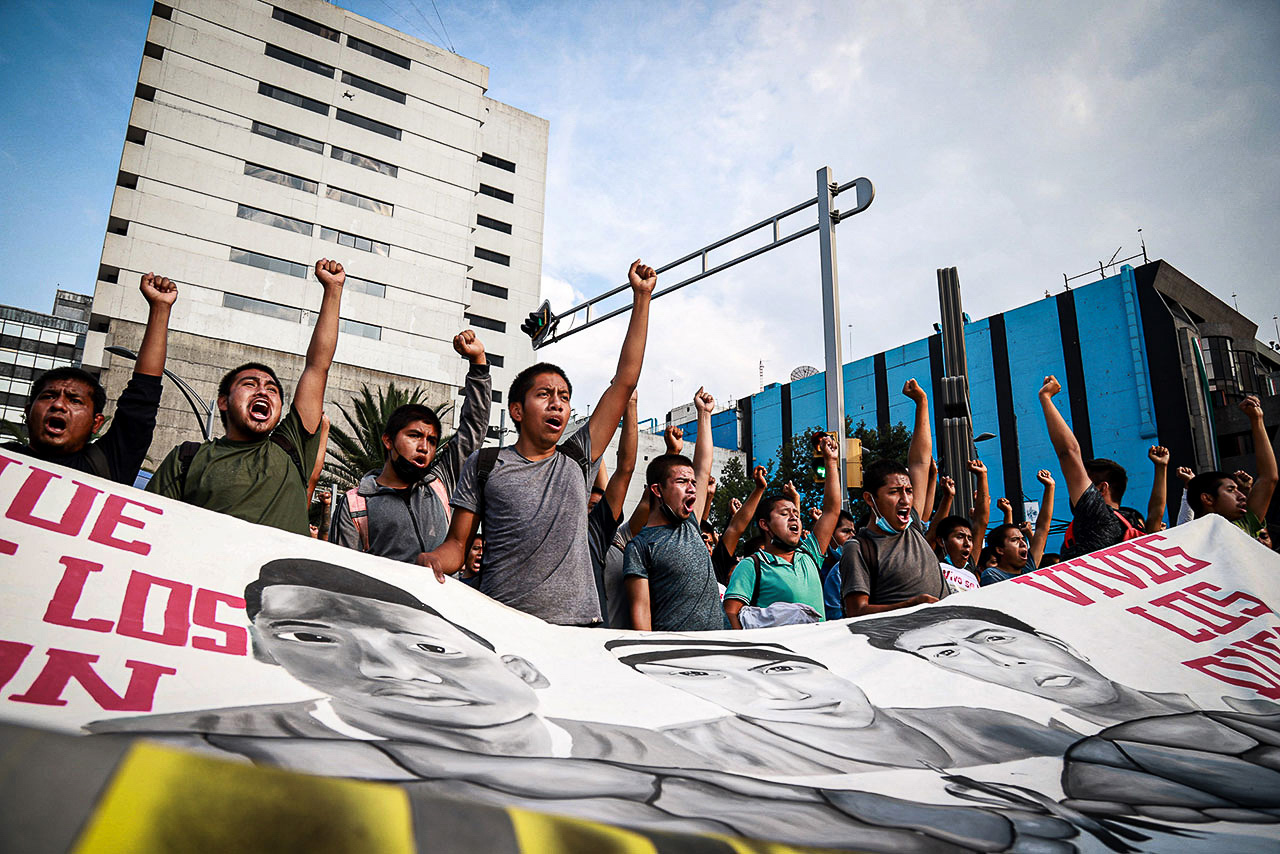
FOCUS: Forced Disappearance in Mexico, the Ayotzinapa Case
13/12/2022
I n September, the Chamber of Deputies approved the initiative of President Andres Manuel Lopez Obrador (AMLO) that grants the Ministry of National Defense full control of the National Guard.
The following day, a journalist asked Lopez Obrador why he had changed his mind when, during his campaign, he made his position against militarization clear and promised to return the military to their barracks in six months. “I changed my mind on seeing the problem that they left me,” AMLO acknowledged.
Civil organizations spoke out against this decision, for going “against the will of the people who elected him, who, among other things, voted for him hoping that he would act to pacify the country, stop the megaprojects against the communities and put an end to militarization. It is an act against the Constitution and the civil government.” The UN High Commissioner for Human Rights, Nada Al-Nashif expressed her concern, especially about the lack of accountability of the armed forces. In addition, she said that this strategy has not been able to reduce crime in the country, but rather complaints of serious human rights violations have increased. According to the media, “so far this six-year term there have been more than 130,000 intentional homicides, 33,000 disappeared and 3,615 femicides; of which, 98% remain unpunished.” However, the National Human Rights Commission (CNDH) said the decision “can be and is admissible, from the point of view of human rights” as long as its intervention is limited in time and subject to exceptional cases. Therefore, “it will not promote any action of unconstitutionality.”
Another aspect that also leads to questioning the decree is an investigation by the Network for Digital Rights (R3D) and various media which revealed that Pegasus spyware has continued to be used during AMLO’s six-year term. This malware is supposedly only sold to governments to prosecute terrorists and criminals; however, in the case of Mexico, its use has been detected since 2017 to monitor human rights defenders, journalists and citizens. The most recent investigation details that the phones of at least three journalists and human rights defenders were spied on with Pegasus between 2019 and 2021. The investigation reveals that SEDENA is the structure that established the 2019 contract. AMLO declared that “we would have no reason to because, in addition to being improper, contrary to our principles, our convictions, we who have been spied on for years, persecuted, could not do the same.”
Several mobilizations were carried out seeking to stop militarization. Among them, the annual march was held in commemoration of the student massacre in Tlatelolco on October 2nd, 1968. More than five decades later, several demands seem valid: no to militarization and an end to impunity. “The Mexican Army has repeatedly and systematically committed serious human rights violations, persecution and extrajudicial detention, forced disappearance, torture and cruel and inhuman treatment, rape and execution are the common denominator of a long list of grievances”, the “68 Committee Prolibertades Democraticas” stated.
For its part, the National Indigenous Congress (CNI) convened a “Global Action against Militarization and Capitalist and Patriarchal Warfare against the Peoples of all of Mexico and the World” on October 12th, the 26th anniversary of its founding, “The fight for life has been our collective word for 530 years and the war against our peoples has always been the response of bad governments. For this reason, we raise our voices and mobilize to demand a total halt to the military siege, the paramilitary attacks, and the counterinsurgency war directed against the EZLN [Zapatista Army of National Liberation] and the Zapatista communities; and against the native peoples of Mexico through militarization and paramilitarization, organized crime, mega-projects of death, and the dispossession of our lands and territories”, the CNI stated.
Other Human Rights Concerns
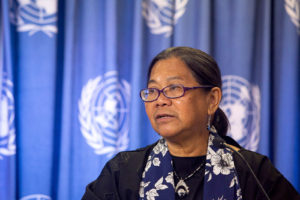
UN Special Rapporteur on the human rights of internally displaced persons, Cecilia Jimenez-Damary © Prometeo Lucero, UN-DH
In the last twelve months, there were a total of 118 events that violated the human rights of defenders, according to the report “Defending Human Rights in Mexico: between Omission and Simulation,” presented by Urgent Action for Human Rights Defenders. (ACUDDEH), the Mexico Cerezo Committee and the National Campaign Against Forced Disappearance. Although, compared to previous governments, the number of human rights violations against defenders has decreased, the AMLO government “has not complied with the responsibilities it has with respect to the rights to memory, truth and justice for the victims.” 69% of the acts were carried out by commission with an increase “in participation in other human rights violations by governments led by MORENA, and the increase in these other violations by the federal government; the increased participation of the armed forces in events; and the slowness in the development, improvement and refinement of a general law initiative for the respect and promotion of the rights of people who defend human rights and journalists”.
On another note, according to the Global Witness report, Mexico ranked first in 2021 on the list of countries with the most murdered environmental activists, with a total of 54 victims. Almost half of them were indigenous. “Over the last ten years, the country has quickly become one of the most dangerous places for land and environmental defenders, with 154 documented cases during this period”, the report states.
In another aspect of growing concern, the UN Special Rapporteur on the human rights of internally displaced persons, Cecilia Jimenez-Damary, was in Mexico from August 29th to September 9th. She visited Mexico City, Chihuahua, Guerrero and Chiapas. At the end of her visit, she highlighted that “the causes of displacement are diverse and multifactorial. Among them are different types of violence, often originated by organized crime, sometimes related to development projects, mining and illegal logging, or electoral, religious and agrarian conflicts.” She mentioned that “the federal government does not have statistics, but that some organizations, academics, and local authorities, gave estimates that there would be between 350,000 and 400,000 internally displaced persons.” She recommended creating a law that protects internally displaced persons, as well as a federal registry of victims. She urged the government to allocate an adequate and sustained budget to be able to provide displaced people with care, protection and lasting solutions.
CHIAPAS: Numerous Hot Spots against a Background of Increasing Violence Due to Fighting between Criminal Groups
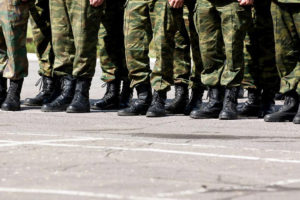
Frayba Report: “Militarization increases violence and perpetuates violations of Human Rights and of the territories of the Peoples” © Frayba
In September, the Fray Bartolome de Las Casas Center for Human Rights (Frayba) expressed its concern over the approval of the reform of the National Guard. “The barracks have been installed in the territories of Original Peoples who oppose the dispossession of their living spaces through the megaprojects of the Federal Government, such as the Maya Train, the Interoceanic Corridor, the Dos Bocas Refinery or the highway infrastructure that connects them”, it warned. It also denounced that “in the midst of the current remilitarization of Chiapas, drug trafficking and consumption have intensified, disappearances and homicides persist, which shows that, as in the 1990s, the strategy is unsuccessful. Among the impacts of violence are: communities attacked and forced to move, in others, curfews, silenced areas have been imposed by criminal groups.”
Along the same lines, the Assembly of the Women’s Movement for the Defense of Mother Earth and Our Territories held a meeting in Chapultenango to analyze the situation in Chiapas. “We agree that in all our territories Organized Crime is ruling, we see an increase in the sale and circulation of weapons, drug addiction, prostitution, and alcoholism. In complicity with a militarization process that allows the dispossession and control of our territories. Women being the most affected by the increase in femicides, deaths, hunger and disappearances of girls and young people”, it stated.
Likewise, in September, residents of Santa Marta in the Chenalho municipality reported shooting, burning houses, and displacement of more than 100 people, leaving four people dead. According to testimonies, at the beginning of this year a peace and disarmament agreement was signed, for which the people who wanted to continue being part of the armed group that maintains hostility against their neighbors in the municipality of Aldama were expelled. These same people (approximately 60) decided to take houses and land by force.
This same month, more than a thousand men and women summoned by the Believing People of the Chab Zone, participated in a pilgrimage in Bachajon, Chilon municipality, to demand the immediate release of nine community leaders and defenders; two from this region, five from San Juan Cancuc and two from Pantelho, in addition to requesting the definitive cancellation of the arrest warrant against Father Marcelo Perez Perez. “These arrests try to repress the just denunciation of our peoples and hinder peace in our territories. The criminalization of these brothers has been for defending the rights of the original peoples, as well as their territory and their customs”, they stated.
Highlighting another type of concern, Roberto Flores, journalist and director of the website “Chiapas Denuncia ¡Ya!”, has been missing since September. He was last seen in Comitan, where he is from. Chiapas Denuncia ¡Ya! is a news site that covers citizen complaints against alleged irregularities by authorities. According to the organization for freedom of expression Article 19, Flores had received intimidating messages after publishing information related to the Sinaloa Cartel.
On another note, in October, the San Pedro and San Pablo de Chicomuselo Parish denounced the worsening of the situation in this area, as well as the threats, harassment and intimidation against human rights defenders in that municipality. This is due to the interest of companies and individuals in restarting mining. They report the entry of several cargo trucks to transport mining material. The parish reported that “the environmental complaint has been formally filed with the Federal Attorney for Environmental Protection (PROFEPA) on the case and the response has been evasive, arguing that there are no security conditions to carry out the investigation in the face of the wave of violence and insecurity that is taking place in the region.”
Finally, in November, feminist groups, relatives of victims of femicide, and the general public gathered in Tuxtla Gutierrez to denounce the increase in violence against women in the state. They recalled that on November 18th, 2016, the Gender Violence Alert (AVG) was declared in the state. However, to the present, reports of this type of violence have increased. They demanded justice, an investigation with a gender perspective that allows the capture of those responsible, decent life opportunities for women, and public institutions capable of preventing, punishing, and eradicating violence against women.
Another issue that feeds the perception of lack of control has been the multiplication of roadblocks, the main ones being led by groups dissatisfied with electoral processes. One of those groups was the residents of Teopisca who, for several weeks in August and September, blocked the federal road section Teopisca-Comitan and Teopisca-San Cristobal. This was done to demand the immediate dismissal of the president of the Municipal Council Luis Alberto Valdez Diaz, who was appointed by the State Congress to replace his brother and at that time mayor of Teopisca, Ruben Valdez, who was assassinated in the month of June. The general assembly made up of 52 communities expressed that this mobilization is for the violation of the rights to democratically elect their rulers.
Another group that has blocked highways is composed of inhabitants of Oxchuc to demand the departure of Luis Santiz Gomez, the current councilor president of the municipality, since his mandate has ended and a new municipal president should be appointed according to uses and customs. Some of these blockades turned violent and led to the arrest of dozens of people.
OAXACA: Attacks against Human Rights Defenders Continue
In September, while they were carrying out cleaning activities in a community primary school, a group of people, including women, girls and boys, was attacked by armed men. The Democratic Civic Union of Neighborhoods, Colonies and Community (UCIDEBACC) denounced that the human rights defender Gregorio Lopez suffered gunshot wounds. In addition, they mentioned “it is clear to us that this new attack obeys a policy of repression systematically sustained against our social organization and its members and even those who accompany us; since the murder of our comrade Humberto Valdovino Fuentes we have seen an increase in dangerous incidents.” The same day, various feminist groups denounced the harassment and criminalization of which Lucero Rivero Ortiz, spokesperson for UCIDEBACC, has been subjected. She has demanded the clarification of the murder of her companion Baldovino Fuentes, an Afro-Mexican community defender of UCIDEBACC in May of this year. Since 2020, Lucero has been part of the Federal Mechanism for the Protection of Defenders and Journalists, but she considers that it does not provide her with protection.
In October, Filogonio Martinez Merino, a former municipal agent of Paso de la Reyna, was murdered in the municipality of Santiago Jamiltepec. For fifteen years he led protests against the Paso de la Reina hydroelectric projects. Martinez was commissioner of the Paso de la Reyna Ejidal in the period 2008-2021, at the time when five defenders of the Council of Peoples United for the Defense of the Rio Verde (COPUDEVER) were assassinated, crimes that were committed at the beginning of 2021 and which remain unpunished to date.
On another front, four years after the gender violence alert was issued in 40 municipalities of Oaxaca, no progress is seen. Since the beginning of the year, 100 Oaxacan women have been murdered, the collective “Rosario Castellanos, GESMujer” denounced. In 2021, GES Mujer registered 87 femicides. In the last six years, 676 girls and women were victims of violent murder. GESMujer stressed that the same practices of action have continued, which are not paying attention and/or are negligent, investigations lacking a gender perspective or with a clear intention to hide or minimize femicide violence, as well as the revictimization of families that demand justice.
Despite the critical context, two movements for the defense of lands and territories made some progress in their demands. After approximately 15 years of struggle, the General Assembly of the San Bartolo Coyotepec community managed to close the wells that since 2002 had been concessioned to the packaging company Gugar S.A. in the community, considering that the concession was granted on land that is communally owned, and without consultation. On another note, in September, the Unitary Agrarian Court of Tuxtepec ruled in favor of community members from Union Hidalgo who had been in a legal process for nine years against Mexican Windfarm Developments (Desarrollos Eolicos Mexicanos – DEMEX), a subsidiary of the Spanish Renovalia Energy. The annulment of land lease contracts that “were improperly considered private property when in reality they are communal lands” was granted. Some organizations pointed out that this ruling is extremely important since it leaves the decision to enter into lease contracts in the hands of the communities.
GUERRERO: Walls of Impunity Foster the Exacerbation of Violence
The most notorious case of human rights violations in Guerrero is Ayotzinapa, and although several national and international bodies have been created to help clarify it, impunity has not receded (see Focus). In September, a federal judge acquitted Jose Luis Abarca, former mayor of the municipality of Iguala, for his alleged involvement in the disappearance of 43 students from the Ayotzinapa Normal Rural School, in 2014.
In October, the Interdisciplinary Group of Independent Experts (IGIE) presented a technical expert report that proves that 181 of the 467 screenshots presented by the Commission for Truth and Access to Justice in the Ayotzinapa case (COVAJ) in its report in August 2022 “have no veracity, because they do not guarantee their originality.” The IGIE said that “the attempt by the Mexican government to speed up the results of the Ayotzinapa case (…) generates greater uncertainty and enormous malaise.”
Taking advantage of these doubts, in November, the lawyers of four soldiers imprisoned in the case accused the head of the Commission for Truth and Access to Justice (COVAJ), Alejandro Encinas, of the alleged crime of fabricating evidence to incriminate their clients. In this regard, the Miguel Agustin Pro Juarez Human Rights Center, which has been accompanying the relatives of the victims, declared that “the non-verification of parts of the COVAJ report does not detract from the accusation evidence on collusion between drug traffickers and the 27th Battalion.”
Other cases, with a lower media profile, similarly continue without progress. Three years after the disappearance and murder of Human Rights defender Arnulfo Ceron, relatives and colleagues from the Popular Front of La Montaña called to persevere in the search for justice. La Montaña Tlachinollan Human Rights Center affirmed that “we have already verified that no party of any color is going to commit itself to the victims, they have their economic interests and are not interested in justice. (…) we have (…) continue fighting like the men and women who lost their lives fighting to transform our state.”
Meanwhile, violence is not receding either. In October, at least 20 people were assassinated, including the municipal president of San Miguel Totolapan and his father, who had also been mayor of this municipality on two occasions. According to Ricardo Mejia Berdeja, Undersecretary of Public Security, these attacks are due to a territorial dispute between organized crime groups. “In that region, a group known as Los Tequileros prevailed, who are dedicated to the transfer and commercialization of opium, as well as kidnapping and extortion, the dispute could be with La Familia Michoacana”, he said.
In November, three members of the Guerrero-Emiliano Zapata Indigenous and Popular Council (CIPOG-EZ) were murdered by the criminal group “Los Ardillos” and “the bad governments” in Chilapa de Alvarez. Members of the organization said that they went to the President of the Republic to warn him about the situation but that “as if nothing had been said and we were condemned to repeat the same story, to mourn our dead and our disappeared, on November 5th three of our brothers were killed.” They recalled that since 2015, 50 members of the group have been murdered and 19 more are missing.
Another matter of concern, according to Article 19, is that Guerrero is the second most dangerous state to practice journalism, hosting 16 of the 157 homicides of journalists in the last two decades. With the murder in August of Fredid Roman, director of the media outlet “La Realidad” and columnist for various local media, there have been 15 journalists murdered in Mexico so far in 2022.
Finally, in documents leaked in the so-called “Guacamaya Leaks” information was revealed indicating that the Secretary of National Defense (SEDENA) identifies Vidulfo Rosales Sierras, lawyer in the Ayotzinapa case, as a member of an organization dedicated to collecting protection fees, extortion and deprivation of liberty in Guerrero. In addition, accusations are made towards other social and human rights defenders. In view of this, various organizations declared that “the agreement between the Armed Forces and the President of the Republic guarantees them immunity and they believe they have the right to point out and attack social activists and human rights defenders, meanwhile they allow criminal gangs to act freely and in many cases associate with them to commit crimes.”

